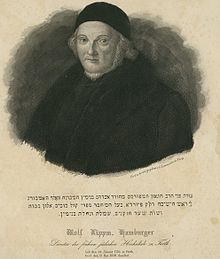Wolf Hamburg
Abraham Benjamin Wolf (Avraham Binyamin Se'ew) Hamburg , also Wolf Hamburger ( Hebrew אברהם בנימין זאב האמבורגborn January 24, 1770 in Fürth ; died May 15, 1850 ibid) was a German rabbi and Talmudist .
Life
Hamburg was born the son of the mayor Elieser-Aron-Lippmann Ansbach from Fürth and Krenle Niederwerrn from Heidingsfeld . His father died a short time later. His mother left him with guardians and moved to live with her second husband in Amsterdam. Hamburg studied in Fürth with Dajan Wolf Ullmann and at the yeshiva of the chief rabbi Meschullam Salomon Kohn . In 1789 he married Rachel-Miriam Cohen (born in Prague, died in Fürth in 1836).
Hamburg followed his teacher Salomon Kohn in Fürth in 1799 as head of the yeshiva there and was also its last head. With his teaching of Orthodox Judaism, he influenced some later rabbis such as Seligmann Bär Bamberger and Moses Sofer . Some of his students, for example David Einhorn , Isaak Löwi, Joseph Aub , Leopold Stein , Bernhard Wechsler , Elias Grünebaum and Moses Gutmann, joined Reform Judaism and thus came into conflict with their teacher.
After the supporters of the Jewish reform movement in Fürth had gained a majority, Hamburg was relieved of all of its offices in 1830. Only the teaching post in the Klaus , which had been founded by his ancestor Bärmann Fränkel (1645 / 1658-1708), was allowed to him. His yeshiva was closed. Soon afterwards he was expelled from his hometown of Fürth and ultimately died of a “broken heart”.
The rabbi was a very well-known man in his day, which is illustrated by his portrait on a porcelain pipe bowl with a silver lid from 1820.
literature
- Leopold Löwenstein : On the history of the Jews in Fürth , page 209, Verlag Olms, 1974, ISBN 3-487-05315-2 and ISBN 978-3-487-05315-8
- Entry HAMBURGER, Wolf. In: Michael Brocke and Julius Carlebach (editors), edited by Carsten Wilke : Biographisches Handbuch der Rabbis. Part 1: The rabbis of the emancipation period in the German, Bohemian and Greater Poland countries 1781–1871. K G Saur, Munich 2004, ISBN 3-598-24871-7 , p. 411 f.
Web links
Individual evidence
- ^ Konrad Schilling: Monumenta Judaica. 2000 years of history and culture of the Jews on the Rhine , exhibition catalog of the Cologne City Museum, 1964: "On a white background, the bust of Rabbi Wolf Hamburg (1770-1850), executed over wide gold stripes in brown camaïeu ."
| personal data | |
|---|---|
| SURNAME | Hamburg, Wolf |
| ALTERNATIVE NAMES | Hamburg, Abraham Benjamin Wolf (full name); Hamburg, Avraham Binyamin Wolf |
| BRIEF DESCRIPTION | German rabbi and Talmudist |
| DATE OF BIRTH | January 24, 1770 |
| PLACE OF BIRTH | Fuerth |
| DATE OF DEATH | May 15, 1850 |
| Place of death | Fuerth |
